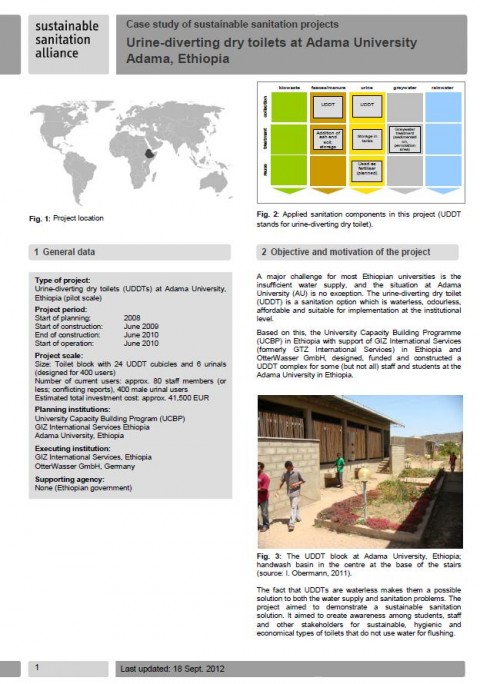Urine-diverting dry toilets at Adama University, Adama, Ethiopia - Case study of sustainable sanitation projects
Yeboah, B. A. (2012)

Published in: 2012
Publisher:
Sustainable Sanitation Alliance (SuSanA)
Author:
Yeboah, B. A.
Uploaded by:
SuSanA secretariat
Partner profile:
common upload
14249 Views
448 Downloads
Location of library entry
Content - Summary
This case study is about a pilot scale construction of urine diverting dry toilets (UDDTs) at Adama University, Ethiopia. A major challenge for most Ethiopian universities is the insufficient water supply and the situation at AU which has a population of more than 13,000 students is no exception. Based on this, the University Capacity Building Programme (UCBP), Ethiopia with the support of GIZ International Services (formerly, GTZ International Services) in Ethiopia and OtterWasser GmbH, designed, funded and constructed a UDDT complex for some(but not all) staff and students at AU in Ethiopia.
The planning of the project with the various project partners began in 2008. The project started as a pilot-scale demonstration unit in June 2009 and was completed and commissioned within a year. GIZ then handed the block over in mid 2009 to AU facility management who is responsible for operation and maintenance.
At the moment, the UDDTs are only used by university staff members. On average 80 persons use the toilet rooms each day. Students are restricted to use the toilets because of limited technical and administrative capability to manage the mass use. However about 400 students use the urinal facilities. As a pilot scale project, the UDDT was not meant to be used by all students and hence they (both the male and female students) do not rely on it.
Both faecal matter and urine could be used as fertilisers in agricultural production. However at the moment both faecal matter and urine are simply disposed off in an existing oxidation pond. Some of the urine collected is applied as fertiliser to a papaya plantation on the university campus close to the UDDT facility
In the course of operations, blockage of urinal have occurred. This problem can be solved by regular cleaning and flushing of the pipes with by water. Sometimes out of negligence or the lack of knowledge some water is added to the faecal matter. This sometimes can result in bad smell from UDDTs because of the mixing of water with the sludge. The immediate replacement of the bin and the provision of proper instructions will help inform users and thus reduce the occurrence of this situation.
Bibliographic information
Yeboah, B. A. (2012). Urine-diverting dry toilets at Adama University, Adama, Ethiopia - Case study of sustainable sanitation projects. Sustainable Sanitation Alliance (SuSanA)
Filter tags
Case studies in SuSanA template English Schools Sub-Saharan Africa Urine diversion dehydration toilets (UDDTs)














